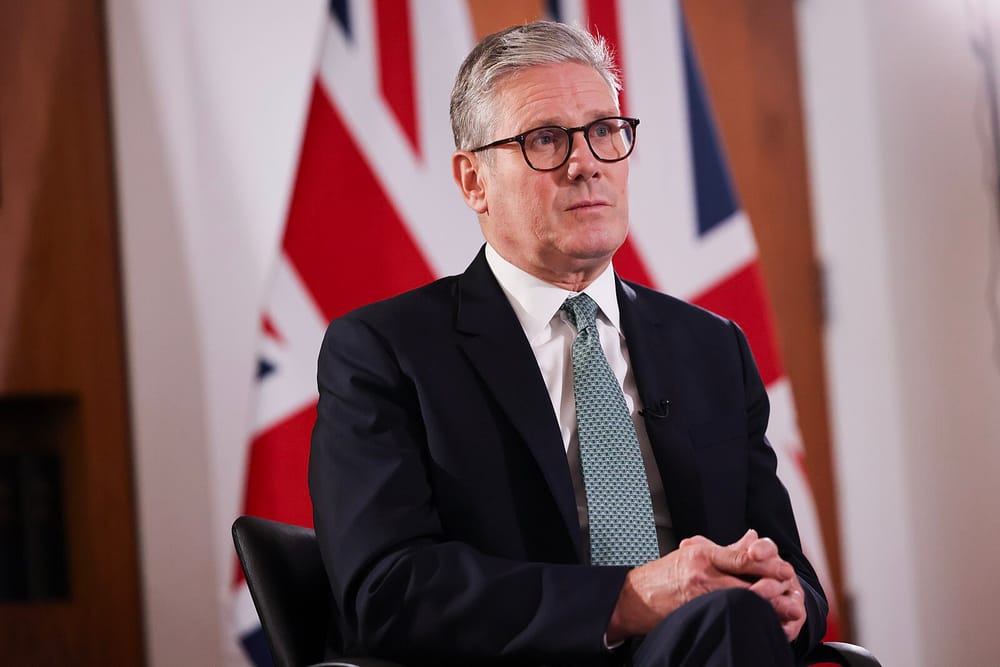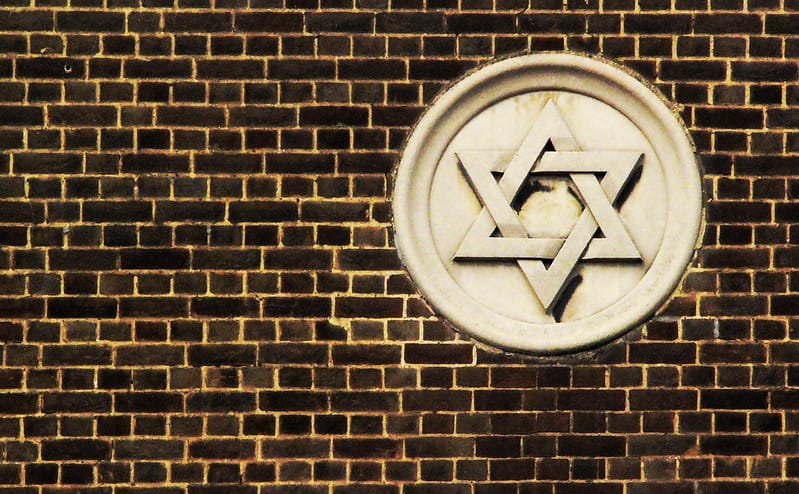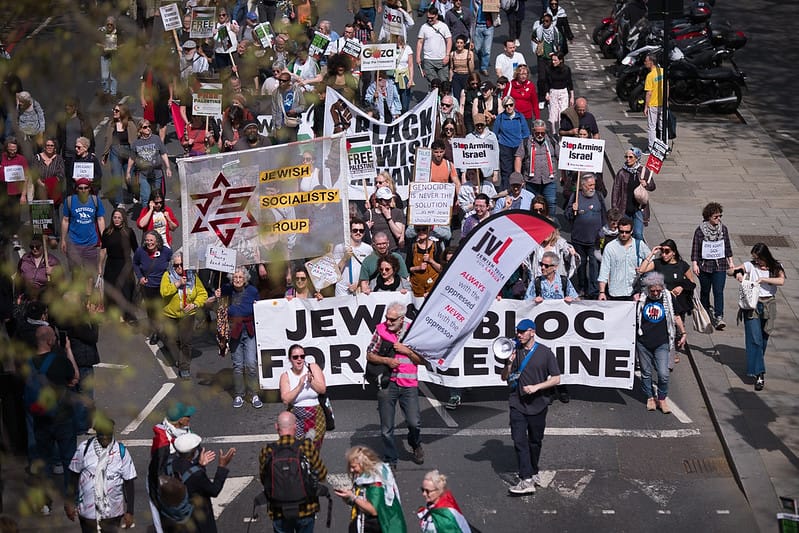“I don't think he would have the boldness to stand up in shul and say that”
In private messages to his former congregants, a leading British rabbi sounds off on race, gender and sexuality.

In a series of WhatsApp messages to his former congregants, one of the UK’s most prominent Modern Orthodox rabbis has made a number of controversial remarks about race, gender and sexuality.
Andrew Shaw questioned the ethics of slavery; complained that “we can’t tell anybody anymore they’re wrong” about their gender; and argued that Charedi schools should not be judged for banning gay students.
Shaw – who between 2000 and 2015 was Community Development Rabbi at Stanmore and Canons Park Synagogue, and has since appeared on panels with former Chief Rabbi Lord Jonathan Sacks and at rallies against Labour antisemitism – made the comments in weekly shiurim (lessons) he sent to dozens of people he knew as children at Stanmore.
For a generation of young people at the shul, Shaw was more than a rabbi – he was a minor celebrity. The rabbi joined the congregation, one of the largest in Europe, when Rachael* was in primary school. She says that over the next fifteen years, Shaw “revolutionised the youth community in Stanmore”, devising endless creative schemes – including trips to Israel, Antwerp and Prague – to engage its younger members. “I was there pretty much every day for different activities […] we felt like we owned the place.”
Rachael always knew Shaw skewed conservative, even for Modern Orthodoxy. A staunch anti-pluralist, Shaw founded the United Synagogue’s youth movement, Tribe, in 2008, in part out of a concern that Orthodox parents were sending their children on summer camp with non-Orthodox Jews. “To put it crudely,” says Rachael, “he was worried they could come back with a “non-Jewish” boyfriend or girlfriend.”
Adam* also recalls Shaw’s concern about whom he dated. As a child, he remembers the rabbi describing homosexuality to him as a “challenge from God”, “a big mitzvah if you’re able to overcome it”. Shaw’s views were and continue to be typical of the Orthodox rabbinate: Rabbi Sacks opposed the introduction of same-sex marriage in 2012; in 2013, Rabbi Alan Kimche, once a candidate for chief rabbi, wrote to his congregants castigating the Jewish conference Limmud for promoting gay and lesbian lifestyles. Adam reckons Shaw’s attitude to homosexuality was part of the reason he didn’t come out until many years later.
Shaw left Stanmore in 2015 to head up Mizrachi UK, an organisation that promotes religious Zionism in Britain. But he missed his congregants, and wanted a way to keep in touch. Two years later, in December 2017, Adam, Rachael and around 70 of their peers found themselves in a WhatsApp group with Shaw (he made a separate group for their parents). Its purpose, the rabbi explained, was to “occasionally let you know of things I’m doing, invite you to stuff, and to give you a Shabbat message every Friday.”
For the next few months, that’s exactly what Shaw did. He’d wish mazel tov to group members on their weddings, send updates about his kids, circulate Shabbat shiurim. “It was all very nicey-nicey,” says Adam. The honeymoon didn’t last long.
Often, Shaw’s Friday sermons looked at current affairs through the lens of a “Jewish or Torah teaching”, says Rachael. Yet the Jewish angle quickly evaporated, leaving only “politics with no Judaism”. On Friday 11 May 2018, the rabbi’s shiur to the group took up “transgender issues”.
“Modern society has some strange ideas about gender,” Shaw opined. “We can’t tell anybody anymore they’re wrong”. As evidence of this, rabbi shared a video from the Family Policy Institute of Washington, in which the organisation’s director asks students at the University of Washington to affirm or deny his chosen identity, a 6’5″ Chinese woman; many happily agree. Things briefly got heated; people trickled out of the group; the rest haven’t posted since January 2019.
Nevertheless, the rabbi persisted. “I don’t know whether it was because he was being challenged too much, or if [the WhatsApp group] was just generating too much controversy,” says Adam, “but he started sending out [his weekly shiurim] individually, which meant that we could talk to him about it, but we couldn’t talk to each other.”
Freed from the judgement of the WhatsApp group, the rabbi continued sharing his provocative shiurim. In that of 26 October 2018, he praised Chief Rabbi Ephraim Mervis’s plans to tackle homophobia in Jewish schools, while defending the Charedi Rabbi Moishe Sternbuch – “a tremendous giant in Torah” – for insisting that gay students shouldn’t be permitted in Charedi schools: “It’s just a different world,” he insisted.
Adam was increasingly upset by Shaw’s messages, and asked to be taken off the broadcast list (“Why?” the rabbi replied; he didn’t remove him). Adam didn’t complain about the shiurim to anyone other than the rabbi, however – while offensive, they were “sort of just par for the course with right-wingers,” he says – until Friday 12 June, when he received a shiur he forwarded straight to Vashti.
In the message, Shaw discusses the statue of slaver Edward Colston, torn down by Bristol protesters the previous day. He argues that the statue ought either to have been removed legislatively, or not at all, but not in the “violent and anarchistic way” it was. Shaw insists he is “not going to get into the wrongs and rights of slavery, because there is no right in slavery – it was wrong.” He continues:
Here’s the interesting bit as far as I’m concerned. When it comes to slavery, if I was brought up in the 17th century or the 18th century, when the slave trade was massive business, would I have been a bad person if I’d have been part of the slave trade? We all agree now that it was tremendously wrong the way they treated fellow human beings – and by the way, the worst kind of slavery was blacks selling blacks; it wasn’t a purely white-black thing; certainly no blacks sold whites, but a lot of blacks sold blacks, a lot of African lands sold their blacks to America and vice versa – but the question is: is it wrong? Because in those days, they didn’t know anything better.
When contacted for comment, Rabbi Shaw offered a full apology:
I want to apologise unreservedly for my remarks in the excerpt you quoted and deeply regret the offence caused. It was a difficult time for me as my father was terribly ill and has now passed away, and that perhaps explains, but cannot excuse the language used in my WhatsApp message and the implication that slavery could be viewed through the lens of moral relativism. As I said in the rest of the message, I wholeheartedly condemn bigotry and racism in any form. Now more than ever, we need to embrace sensitive and considered dialogue; something I’ve failed to do and for which I’m very sorry. We must all educate ourselves better on these issues and engage with them with more sensitivity and clarity.
A number of Jewish communal organisations condemned Shaw’s remarks; the Office of the Chief Rabbi declined to comment.
Marie van der Zyl, President of the Board of Deputies:
There can be no relativisation of the historic evil of slavery, which is both wrong and offensive. Rabbi Shaw’s apology must be followed by actions which heal the hurt his words will have caused.
A spokesperson for Stanmore and Canons Park Synagogue:
The remarks which have been reported to us are highly inappropriate, and neither reflects nor represents the opinion of our community, members and the leadership.
Rachael is sceptical of her synagogue’s attempt to distance itself from its former employee. “I think he is probably just saying what, unfortunately, a huge amount of the Jewish population thinks.”
Similarly, while Adam is sure that the rabbi was emboldened by his private forum (“I don’t think he would have the boldness to stand up in shul and say that”), he does not see Shaw’s views as anomalous, but rather as an extreme manifestation of a subtle antiblackness in his community: “I mean, no one’s going around calling other people the N-word… it’s a little bit more covert than that.”
He points me to Jewish Britain and Jews in Britain, two private Facebook groups with around 10,000 members between them. “Apparently, no Father’s Day cards or condoms were stolen [by looters in the Minneapolis],” commented one member of Jews in Britain. “Not that I agree with slavery,” wrote another, underneath a post about the removal of Edward Colston’s statue, “but if it had not have happened, there would be no Black people living in the Western country, what would have happened to their lives […] they would still be living in Africa in squalor.” A number of members of both groups who challenged comments such as these were removed by group admins; one was told the reason was that she was “forcing my opinion on other people”.
Yet not always are such views on race “covert”, confined to private Facebook or WhatsApp groups. In a blog post for Mizrachi UK, published the week before his shiur on Colston, Shaw argued that Black people should “refuse to behave like victims of an unjust world”. In his blog, Shaw quotes at length from that of Melanie Phillips: “[T]he image of a black man dying while pinned to the ground by a white police officer graphically embodies the belief that black people are victims of white racism,” Phillips blogs. “And victim culture […] turns morality upside down.”
Phillips – heralded Stonewall’s 2011 ‘Bigot of the Year’ – caused widespread dismay in December for arguing in her Jewish Chronicle column that the concept of Islamophobia was “bogus” and “profoundly anti-Jew”. A number of high-profile Jewish figures, including other JC journalists, disavowed Phillips’s article – though notably, not her editor. Two months later, Jewish Book Week invited Phillips to interview her fellow culture warrior Douglas Murray in front of a packed auditorium. Just months ago, JFS asked Phillips to address its sixth formers.
George Floyd’s killing in May has precipitated an outpouring of solidarity from British Jewry. It has also prompted us to take a long, hard look at our own racism: the Board of Deputies recently launched a Commission on Racial Inclusivity in the Jewish Community. Rabbi Shaw’s apology bespeaks this moment of communal introspection. Yet without action, his words will ring hollow to many. To them, the enduring prominence of Phillips and her rabbinic disciples represents the continued acceptability of racism within British Jewry, and the difficulty of holding influential figures with unsavoury views to account. ▼
*Not their real names.
Have your Jewish leaders said or done things that have made you uncomfortable? [email protected], or message us anonymously.
Author
Rivkah Brown is an editor at Novara Media and the former editor-in-chief of Vashti.
Sign up for The Pickle and New, From Vashti.
Stay up to date with Vashti.



